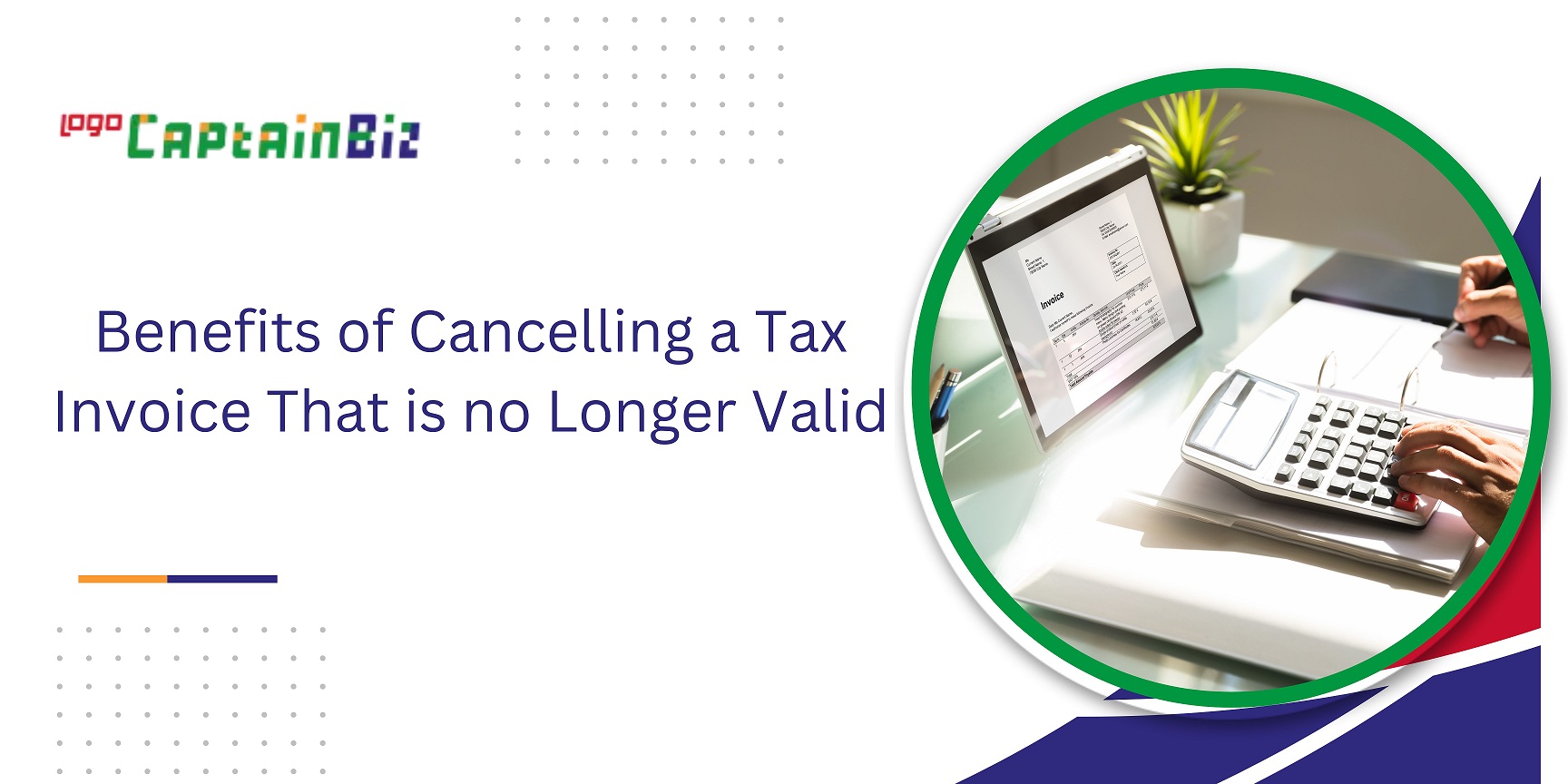Eligible businesses must register and obtain a GST registration number. When you supply taxable goods or services, you must generate a tax invoice without fail. The same business can supply both taxable and non-taxable goods. You must issue the correct GST tax invoice with GST rates to comply with GST laws.
Ensuring GST compliance is necessary to avoid penalties and fines. If the authorities suspect you issue fake invoices, they may need to audit your business. It will result in unnecessary costs and business disruptions. If the issue is related to high-value tax, you may even be prosecuted.
In this blog, we will explore the importance of cancelling a tax invoice if you have created invalid invoices.
Importance of a Valid Tax Invoice
The GST tax invoice is an essential document that proves the supply of taxable goods or services. The invoice will contain all the details about the supply transaction. Every GST-registered business must issue a GST tax invoice when they supply goods. GSTIN is the registration number of the business that must be present in the tax invoice. Other details, like the breakup of GST, must be mentioned.
If your business meets the condition for generating an e-invoice, a verified and validated e-invoice is a valid tax invoice. The e-invoice is not a soft copy of the invoice. The e-invoice is the original valid tax invoice. If the supply involves transporting goods, the e-invoice will be linked to the e-way bill.
You must use the e-invoicing portal (Invoice Registration Portal (IRP)) and input the tax invoice details. The system will automatically generate the e-invoice. The details from the e-invoice will be auto-populated in the GST forms.
This seamless process has several benefits, such as:
- All business supply documents become tax-compliant in real-time
- A single source of truth will be available
- Business processes become naturally compliant
- Auto population of invoice details minimises errors
- Generation of e-way bills as and when required
- Mitigate GST fraud activities
- Improve invoice financing options for SMEs
- Speed up payment cycles
- Reduce processing costs
- Improve business financing transparency
- Enhance business efficiency
Understanding Tax Invoice Validity
For businesses that don’t meet the condition of an annual turnover of Rs. 5 crore, e-invoicing is not necessary. However, you must generate a GST tax invoice following the invoice format. Experts predict that in the next few months, e-invoicing will become mandatory for all GST-registered businesses. Nevertheless, the details necessary for a valid invoice are the same for GST-compliant tax invoices and e-invoices. Some of the mandatory details that must be present in a valid tax invoice are:
- Invoice number and date
- Customer name
- Billing and shipping address
- Supplier and recipient’s GSTIN
- HSN code
- Value of taxable goods or services
- Discounts
- GST rate, type, and amount of tax
- Details of supplied goods or services such as description, unit price, and quantity
All the above details must be correctly mentioned in the tax invoice. Otherwise, the tax invoice may become invalid.
Errors That Can Render a Tax Invoice Invalid
When the supplier generates the invoice, there could be errors. Some of the mistakes that can result in an invalid tax invoice are:
- Tax invoice is not created as per the notified schema
- The invoice contains duplicate IRN
- Invalid GSTIN of supplier or recipient is mentioned
- Invoice not generated within a time limit
- Wrong details about supplied goods and services
Consequences of Not Cancelling a Tax Invoice That is No Longer Valid
Suppliers must pay attention to the tax invoices they generate. The recipient can use the invoice to claim Input Tax Credit (ITC) wrongly. The authorities may think that the supplier helped a person to commit fraud. When a wrong or invalid tax invoice is used for transportation of goods, the authorities can seize the goods.
The main reason why you must cancel a tax invoice is to avoid GST non-compliance. When you issue an invoice, you must pay the GST. There is no need to pay GST for an invalid invoice. However, you must take measures to cancel the invoice properly.
If the invalid tax invoices are still uploaded to the GST forms, it can result in discrepancies. The authorities may suspect that you are trying to commit tax evasion. This can result in audit triggering. Sometimes, it can also result in penalties.
Benefits of Cancelling a Tax Invoice That is no Longer Valid

If there are mistakes in the tax invoice, you must cancel the invalid invoice. It will not only help you manage your tax liabilities but also ensure compliance. Some of the benefits of cancelling a tax invoice are:
- Ensure accuracy and compliance – Businesses must always maintain accurate invoices and records of all their financial transactions. Cancelling invalid tax invoices will help you get a precise report of the financial health of your business.
- Reduced tax liability – Cancelling invalid invoices will reduce your GST liability. You can avoid paying taxes on transactions that should not be subject to GST.
- Refund or adjustment – Recipients can manage their ITC correctly only with a valid tax invoice. Cancelling invalid tax invoices will help your customers avoid GST penalties.
- Audit trail – Cancelling invoices and maintaining accurate records of cancelled invoices will create an audit trail. If the authorities find any discrepancies in your GST forms, they can quickly verify the authenticity and originality with the audit trail.
- Issue the correct invoice – Human mistakes always happen. By cancelling an invalid tax invoice, you can issue the right invoice and mention all the correct details.
- Avoid penalties – GST-registered businesses must always demonstrate compliance. Otherwise, it can result in unnecessary penalties. Cancelling invalid tax invoices can help you avoid penalties.
Best Practices for Cancelling Tax Invoices
The invoice details that you enter in your accounting software are usually auto-populated in the GST forms. If the software is integrated with the e-invoicing portal, the invoice details will be used directly for generating e-invoices. So, ensuring accuracy and double-checking all the invoice details is important before generating a GST tax invoice. You also must be aware of how to avoid cancelling a tax invoice that is still valid. Cancelling a valid tax invoice causes problems with GST compliance for suppliers and recipients. It can also result in the seizure of goods that are transported with a valid but cancelled invoice.
Despite all your best efforts, mistakes can happen, and they can render your tax invoice invalid. Cancelling invalid invoices in the right way is essential. Some of the best practices for cancelling an invoice are:
- Verify the need for cancellation and ensure that the invoice is, in fact, invalid
- Ensure that the tax invoice is not related to any e-way bill
- Notify the recipient about invoice cancellation
- Use the IRP portal or GST portal to cancel the invoice in the right way
- Check and double-check whether you have cancelled the invoice properly
- Update your GST forms to reflect the changes in the invoices
- Ensure that deleted and cancelled invoices are properly recorded in your system
Conclusion
Manual processing of invoices will result in too many errors. Automated billing tools create GST-compliant invoices and reduce human errors. However, mistakes can happen, and the tax invoice will become invalid if it doesn’t adhere to the schema and format. If you identify mistakes in an invoice, you can amend it using the GST portal. For invalid invoices, you must cancel the invoice and issue a new one instead. Ensuring the accuracy of your financial transactions will help with GST compliance.
Are your business invoices becoming too complex to handle on your own? Automate the GST billing process with CaptainBiz. Generate GST-compliant invoices, issue to your customers, upload to the GST portal, generate GST reports, and submit GST forms using a single interface with a few clicks.
FAQs
-
Does cancelling an invoice affect the GST liability of the supplier?
Yes, every tax invoice specifies the GST that the supplier must pay to the government. Invalid invoices will also result in GST liabilities. If you cancel an invoice, you need not pay the GST for the invalid invoice. So, the GST tax incurred will also change.
-
How does cancelling an invoice affect the recipient?
Recipients who get the tax invoice from the supplier can claim an input tax credit (ITC) based on the invoice. This ITC can be used for payment of their GST tax. So, ITC helps buyers to reduce their tax liabilities. If you cancel an invoice, it will also be reflected on the GST forms of the buyer. They will not be able to claim ITC on cancelled invoices. It will change their GST liabilities also.
-
Can I cancel the invoice online?
When you use the e-invoicing portal to generate an e-invoice, you can directly cancel the invoice using the IRP portal with the IRN or acknowledgement number. This is possible when you cancel the invoice within 24 hours of generating IRN. If the time has lapsed and is more than 24 hours, you must use the GST portal to cancel the invoice. This is allowed if you have not submitted the GST return for the tax period. In both cases, you can delete as many invoices as you want online.
-
Can I cancel the invoice offline?
You may not always be connected to the internet for cancelling the invoice. You can also delete the invoice offline. This involves a few additional steps. First, you must create a JSON file using the GST portal with all the invoices. Desktop tools can be used to read the JSON file and open it. You can then cancel and delete the invoices one by one or in bulk. After cancelling the invoices, you must update the JSON file. On the GST portal, upload this JSON file to ensure cancellation is reflected on all the GST forms.
-
Can I cancel old invoices?
If the supply is not made against an invoice, you can cancel old invoices. The GST portal allows you to cancel invoices for any financial period before you file the GST returns. If you have already made a supply against the invoice, you must not cancel the invoice. Instead, you must inform the supplier and generate a credit note to offset GST on the cancelled invoice. You must follow the same process if you have already submitted GST returns but wish to cancel the invoice included in your return.
